Looking for the best Elementor SEO tips?
Following search engine optimization (SEO) best practices is essential if your website is to rank well. It will help ensure greater visibility online and help you drive relevant traffic to your site.
If you’re reading this, you probably know what Elementor is. You also know that it offers a lot of conveniences when building websites.
But how do you ensure that convenience marries SEO on your Elementor site?
In This Article
- Elementor SEO: 10 Tips for Optimizing Your Elementor Site
- 1. Leverage the Right SEO Tools
- 2. Use AIOSEO to Optimize Your Elementor Site
- 3. Improve Your Site’s Loading Speed
- 4. Optimize Your Content
- 5. Build Internal (and Outbound) Links Strategically
- 6. Build Quality Backlinks
- 7. Implement Schema Markup
- 8. Optimize Your Robots.txt File
- 9. Optimize Your Metadata
- 10. Use SEO-friendly URLs
- Elementor SEO: Powering You to the Top of the SERPs
Elementor SEO: 10 Tips for Optimizing Your Elementor Site
I’m sure one of the reasons you chose Elementor as your page builder is that it’s good for SEO. However, that doesn’t mean all your pages will be automatically optimized for SEO. To ensure your pages are optimized, you have to be proactive and do it yourself.
Here are ten simple Elementor SEO tips that will help you rank your website:
1. Leverage the Right SEO Tools
To get the best out of your Elementor website, you must know and use the right SEO tools. Of course, if your site is built on WordPress, you’ll have a greater array of SEO tools at your disposal. Here’s a brief rundown of the essential ones:
- Google Search Console (GSC): GSC is a free tool that gives you data on your website’s health and performance.
- Google Analytics (GA): GA is another free tool from Google that gives you insight into important user analytics. Examples include, among other things, website visitors, acquisition channels, and what they do on your website.
- Keyword research tools: SEO hinges on leveraging search terms users input into search engines. Keyword research tools are essential for discovering these search terms. Some of the best include Ahrefs, Semrush, Serpstat, e.t.c.
Armed with the right tools, setting up your website for success becomes easier. For example, you can develop SEO campaigns based on actionable data. You can also track your rankings, enabling you to know whether your SEO efforts are working or not.
2. Use AIOSEO to Optimize Your Elementor Site
All-In-One-SEO (AIOSEO) is the original WordPress SEO plugin, having been around since 2007. It is a multifaceted toolkit that can help you with your on-page SEO, off-page SEO, and technical SEO. You don’t even have to hire an SEO professional as it’s a DIY tool.
However, the best part about AIOSEO is that it integrates with Elementor and works right from within the page builder.
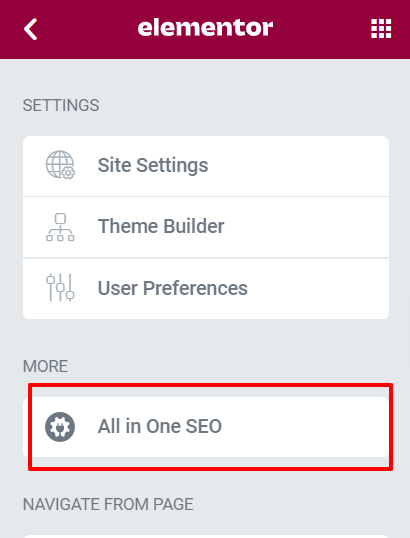
If you have AIOSEO version 4.1.7 or newer, you can access all the power of AIOSEO right from within the page builder. This will help you optimize your pages and posts as you build them.
If you’ve been an Elementor user for some time, you probably know that the content workflow in Elementor has never been intuitive. Having AIOSEO baked into the page builder makes it a seamless experience when creating optimized pages. It also results in you having the ability to implement SEO best practices. Examples of what you can do with AIOSEO in Elementor include:
- Optimize your meta title and description tags
- Configure your structured data for rich snippets
- Determine how your social media images will look when users share your content
- Define link attributes for internal and external links
- Set custom canonical URLs
- Edit your robots.txt files
Elementor SEO has never been easier! With the combination of your favorite page builder and the best WordPress SEO plugin, you can easily build beautiful websites that well.
3. Improve Your Site’s Loading Speed
One reason Elementor is so loved is the convenience it offers users — it’s so easy to use. Unfortunately, that comes with a price tag, and that’s a compromise in speed. Compared to other page builders like SeedProd (and even Gutenberg), Elementor’s code is heavy. This makes Elementor pages load slower.
Speeding up your site is crucial as load speed is one of the top-ranking factors.
FYI, anything above 3 seconds loading time is considered slow, especially for e-commerce sites. To check how fast your site loads, you can use tools like Pingdom and GTMetrix, among others.
Let’s briefly look at a few tips to help you get your Elementor site fast enough to please search engines and users:
- Use a performance-optimized hosting provider
- Use a lightweight theme
- Minify CSS and JavaScript files (you can easily do this with a plugin like Perfmatters)
- Compress your images
- Only install necessary plugins
- Use a content delivery network (CDN)
Speeding up your Elementor site requires you to tweak several elements. While this may be time-consuming, the positive impact on your website is well worth it.
4. Optimize Your Content
The main reason people visit your website is to get information. Therefore, you must invest in crafting content optimized for discoverability by search engines and readability for users.
One of the first steps in creating optimized content is to conduct keyword research. However, keywords alone won’t help you rank your pages. You should also understand the intent of the search queries you’re targeting. This will help you craft content readers will find helpful.
Other ways to ensure your content is optimized include:
- Craft crisp, concise copy
- Include a lot of white space and images for easy scanning
- Use your keyword and its variations in your subheadings
- Meet Google E.A.T standards
Optimizing the content on your pages will result in higher chances of ranking well on search engine results pages (SERPs). It will also lead to better conversion rates and increased engagement.
5. Build Internal (and Outbound) Links Strategically
Since Google introduced PageRank in 1998, links have played a significant role in SEO. That’s why building internal links is an essential aspect of Elementor SEO.
Internal links are links pointing to or from one page on your website to another.
Your internal links must be relevant to the page linked to/from for greater impact. However, building strategic internal links can be time-consuming if you have many pages on your website. Thankfully, AIOSEO has a nifty tool called Link Assistant to help you quickly build internal links.
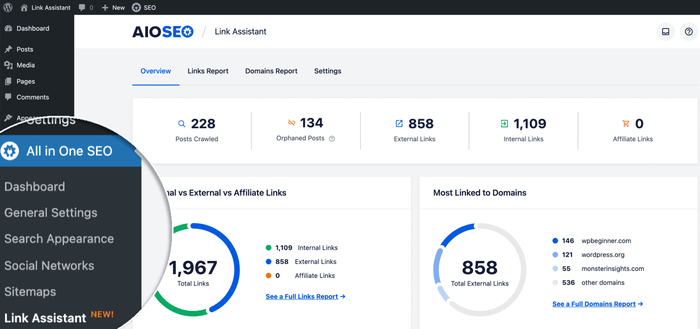
One of the best features of Link Assistant is that you can build your links fast — without opening the individual pages you’re building links to. With a robust internal linking strategy, your Elementor pages will have a better chance of ranking. But more importantly, well-executed internal links help improve the user experience as users can easily find more information.
As you build your internal links, don’t forget to create outbound links. These are links from a page on your website to another website. Outbound links help give your content more context. They also help add credibility and authority to your content. While Link Assistant can’t help automate this process, it can help you audit the outbound links on your site.
6. Build Quality Backlinks
Backlinks are another important type of link you must build to optimize your Elementor pages.
Backlinks are links from another website to yours. These are crucial to optimizing your Elementor pages for SEO as they are regarded as votes of confidence by search engines. However, because not all backlinks are the same, you must ensure to focus on quality and quantity. Quality links are those from authority sites in niches relevant to your topic. A few ways to build backlinks include:
- Guest posting
- Fixing broken links
- Running outreach campaigns
- Getting listed on partner pages or business directories
With high-quality backlinks pointing to your page, ranking high on SERPs becomes easier.
7. Implement Schema Markup
Schema markup (structured data) is code you can place on your website to help search engines better understand the content on your page. This helps search engines display more informative results on SERPs. These results are called rich snippets:

Rich snippets help increase the clickthrough rate of your content as they help prove that your content meets search intent. This, in turn, signals to search engines that your content is valuable. As a result, they’ll push it higher up in search results.
How do you implement schema markup on your Elementor site?
Thankfully, you can easily do it with AIOSEO — no coding required. All you have to do is select the type of schema markup you want on that page, and AIOSEO generates it for you.
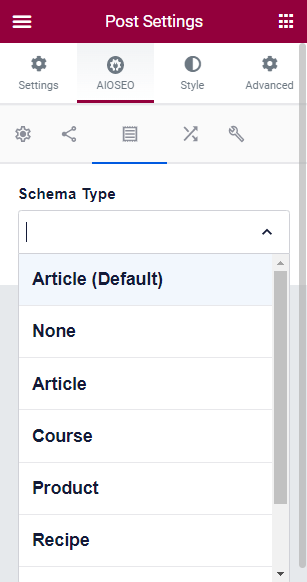
Remember, this can all be done right from within your Elementor settings.
8. Optimize Your Robots.txt File
One little-used Elementor SEO tip is optimizing your site’s robots.txt file. This is a file that gives search engines instructions on how to crawl your website. For example, you can use it to specify which pages to crawl and which to ignore.
Again, this is a no-code configuration if you’re using AIOSEO. You can configure your robots.txt settings from the plugin or use the plugin baked into Elementor.
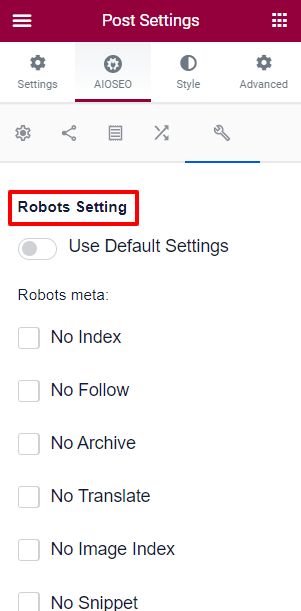
Prioritizing important pages in the robots.txt file ensures that those pages are crawled and indexed. Note, however, that pages you exclude from being crawled won’t be de-indexed. This is because the main purpose of the robots.txt file is to prevent low-value (in terms of SEO) pages from being crawled.
9. Optimize Your Metadata
Another way to optimize your Elementor pages for SEO is to optimize the metadata for that page. While search engines don’t include metadata as a ranking factor, it does indirectly impact your SEO. This is because optimizing your metadata helps improve your clickthrough rates.
Just to be clear, let’s briefly look at the metadata you must optimize on your Elementor page:
- SEO title: This is an HTML element used to specify the title of a web page. It’s displayed as part of the snippet on SERPs.
- Meta description: This is a short summary of your post. Use it as a sales pitch to get people to clickthrough into your post.
To optimize your metadata, always include your focus keyword — preferably as close to the beginning as possible. Also, make sure to stick within the character limits. Otherwise, some words may be cut off on SERPs.
Don’t worry. This isn’t very complicated, especially if you have AIOSEO baked into Elementor. Just head over to your AIOSEO settings in the Elementor dashboard:
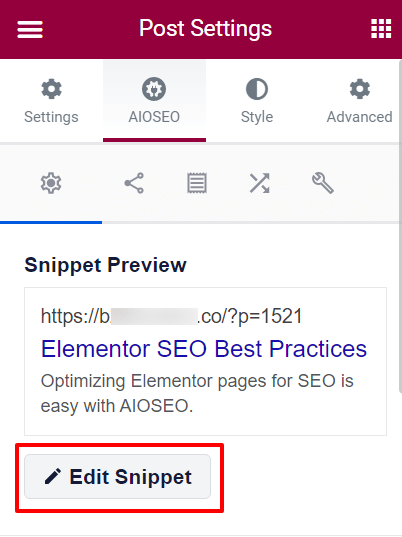
Click on the Edit Snippet button, and a window will open where you can edit your SEO title and meta description.
10. Use SEO-friendly URLs
URLs may seem like insignificant elements of a webpage, but they play a big role in boosting the SEO of your Elementor page. They are an essential element of your technical SEO. One reason for this is that they tell search engines and users what your page is about. To ensure your URLs are SEO-friendly, customize them to be:
- Logical
- Short and descriptive
- Easy to read
- Intelligible to readers
- Include your focus keyword
Customizing your URLs will also help show readers that your content will meet their search intent. To do this, include your keyword. If you’re a WordPress user, avoid using the default URL WordPress assigns to a post. Instead, edit it to make it SEO-friendly. You can easily do this using AIOSEO.
Elementor SEO: Powering You to the Top of the SERPs
Ranking your website high is essential to your business’s success. That’s why you must do everything in your power to give your site the best chances of ranking. Using the ten tips above, you can optimize your Elementor pages for improved performance on search.
Remember, if you need an SEO tool that works right within your favorite page builder, AIOSEO is it. You can use the SEO toolkit to work on most on-page SEO, off-page SEO, and technical SEO aspects. If you’re not using AIOSEO yet, make sure to download the plugin today.
Disclosure: Our content is reader-supported. This means if you click on some of our links, then we may earn a commission. We only recommend products that we believe will add value to our readers.
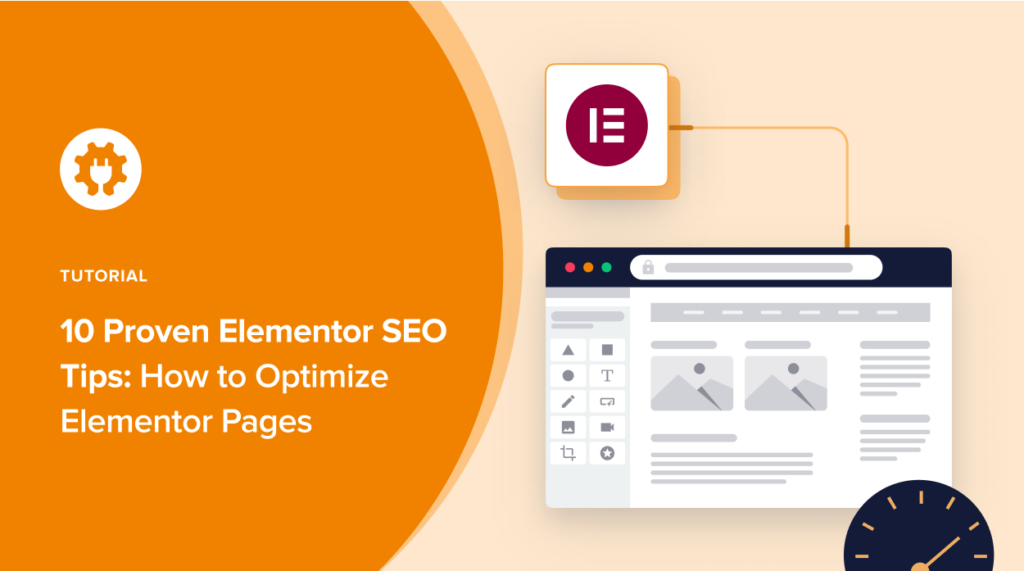

Elementor have improved speed drastically and continually improve with each update with cleaner code.
Hi Adrian,
Thanks for this. Yes, Elementor is a great brand and they are constantly updating their product. It Definitely is one of the best builders on the market.